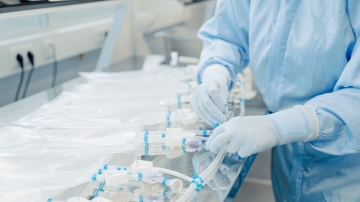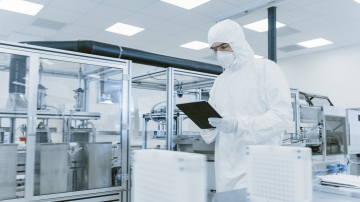How Pharma 4.0 eliminates human errors in pharmaceutical industry
Table of contents
ShowHuman errors in the pharmaceutical industry are a cost burden for all participants in the supply chain. 30-40% of all deviations are being caused by some form of human failure in operative handling. Even in cases where the error is considered minor, there has to be extensive investigation and testing to confirm the root cause.
And with medical drug products becoming ever more complex, the root cause analysis procedures as well as the corrective and preventive actions required are becoming increasingly elaborate too. But how can Pharma 4.0 contribute to minimize human error in pharmaceutical manufacturing?
Pharma 4.0 aims at improving risk management. It aims at updating the pharmaceutical industry and ensuring data integrity by incorporating advanced digital formats and enablers into the current Pharmaceutical Quality System (ICH Q10). The final goal is to minimize, if not eradicate, human error. It is to ensure error prevention and flawless GMP by defining and implementing sustainable CAPAs (corrective and preventive actions).
Types of and reasons for human errors in pharmaceutical industry
In order to ensure the success of Pharma 4.0 it is necessary to look at the types of human error in the pharmaceutical industry alongside their root causes. Generally speaking, human errors can be either active or latent. It takes human error investigations to identify the main problems.
Active failures are direct and immediate causes of accidents or deviations. They are usually made by front-line staff, such as operators of medical devices. In other words, human factors play a major role. There are three types of active human error:
- Slips and Lapses – made inadvertently by experienced operators during routine tasks
- Mistakes – decisions subsequently found to be wrong, though believed to be correct at the time
- Violations – deliberate deviations from rules for safe operation of equipment.
Latent failures on the other hand are those aspects of an organization that influence human behavior and potentially lead to active failures. Contributing factors include, but are not limited to, lack of time, lack of knowledge, inadequate procedures and manufacturing processes, wrong labeling, fatigue, work pressure, inadequate retraining as well as poor equipment design or workplace layout.
Different types of human error can have different consequences, but ultimately they are all detrimental to the patient. As long as pharmaceutical manufacturing involves human performance, there will always be potential for human error. This is why quality assurance plays such an important role, and corrective and preventive actions will always be necessary.
Eradicating human error with the implementation of Pharma 4.0
The implementation of Pharma 4.0 standards and SOPs aims to reduce the different types of human error through the automation of processes that have traditionally involved human performance.
While the pharmaceutical industry may generally be fast-paced and open to innovation, it is also known to be somewhat hesitant when it comes to far-reaching reforms. And with many of the processes and procedures well established, there may - seemingly - be no pressing need to rethink certain standards and SOPs. However, in the long run, the implementation of Pharma 4.0 will be a major driver to improved performance. Not only will the level of human error be reduced sustainably, but the change management process will also lead to decreased costs and a reduced need for resources.
Automation makes human interventions redundant
In an industry where accuracy is essential and even minor lapses can lead to far-reaching consequences, automation is key. Where traditionally the majority of quality control measures was done manually, Pharma 4.0 is introducing automated systems that are increasingly taking over. They are successfully replacing human intervention and at the same time leading to new levels of error prevention.
Digitalization prevents human errors in pharmaceutical manufacturing
Digital transformation is already improving throughput, efficiency, quality and visibility across pharmaceutical manufacturing. But in order to realize the full potential of digitalization, it is important to see the bigger picture and apply strategies that are lasting.
It is important to consider how workflows may evolve in the future and to ensure data integrity, not only in the present but, even more importantly, in the long run. Intelligent digital platforms should simplify procedures and enhance outcomes by acting as a driving force behind human error reduction.
Establishing new standards
An important step towards eradicating human error in the pharmaceutical industry is the consideration of new standards, both in the analog and digital realm. Only if those two separate worlds are synchronized will the implementation of the Pharma 4.0 quality management system be successful.

Single-use systems with Pharma 4.0 approaches reach higher safety standards
As relatively new and always innovative solutions, both single-use systems and Pharma 4.0 go hand in hand.
Single-use systems in themselves are characterized by their flexibility, agility and scalability. Combined with progressive technological and digital advancements, platforms based on single-use technology can be the ideal vessel to implement Pharma 4.0 metrics and standards.
The data-driven approach behind Pharma 4.0 facilitates connectivity between various information systems, devices, and machines. It allows for error prevention by means of data-driven and automated processes throughout all stages of pharmaceutical manufacturing.
Single Use Support is at the forefront of Pharma 4.0 developments: The inclusion of radio frequency identification tags into their products allow for the digitalization of each single product, while cloud-based solutions allow full access to the data. The data not only provides a full and comprehensive overview of the entire manufacturing process but allows for continuous traceability of any given product equipped with an RFID tag.








